Author:
• Tim McGuinness, Ph.D., DFin, MCPO, MAnth – Anthropologist, Scientist, Director of the Society of Citizens Against Relationship Scams Inc.
Article Abstract
Relative Deprivation is a psychological concept and cognitive bias that arises when individuals perceive themselves as unfairly disadvantaged compared to others.
Relative Deprivation occurs when people feel they lack resources, opportunities, or status relative to those around them, leading to resentment and discontentment.
Scam victims often experience this when comparing their suffering or recovery progress to that of others. This can exacerbate feelings of inadequacy and frustration, hindering their healing process.
Overcoming relative deprivation involves acknowledging emotions, seeking support, and reframing perspectives. By celebrating progress and focusing on gratitude, victims can reclaim control over their narrative and pave the way for a brighter future amidst adversity.
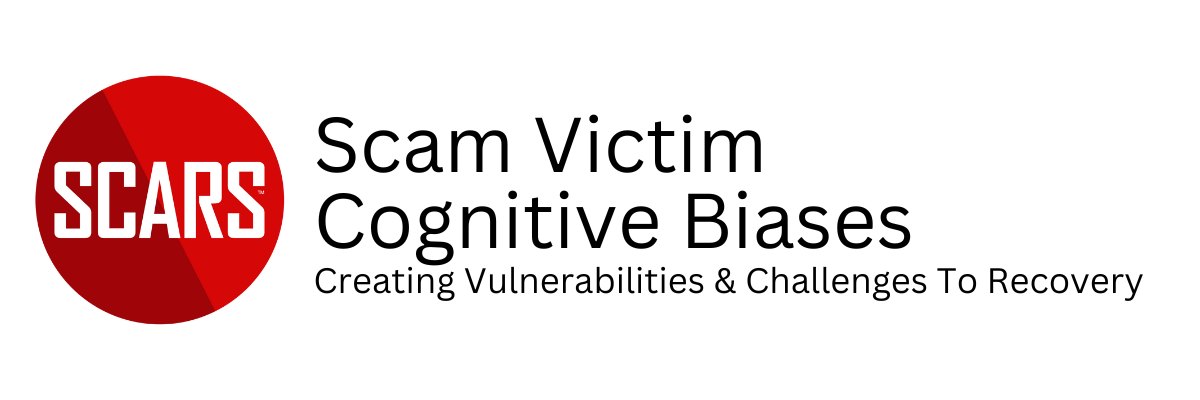
Relative Deprivation is a Psychological Concept that arises when Individuals Perceive themselves as Unfairly Disadvantaged compared to others
It occurs when people feel that they lack resources, opportunities, or status relative to those around them, leading to feelings of resentment, frustration, and discontentment. In the context of scam victims, relative deprivation can manifest when they compare their own suffering or victimization to that of others.
Introduction to Relative Deprivation
After a scam, individuals often face a tumultuous journey towards emotional recovery. While the immediate financial repercussions are evident, the psychological aftermath can be equally, if not more, debilitating. Among the multiple of challenges that scam victims encounter during their recovery journey, one often overlooked yet profoundly impactful factor is relative deprivation. This psychological phenomenon, a cognitive bias, rooted in social comparison, can cast a long shadow over victims’ attempts to heal and rebuild their lives.
Scam victims experience relative deprivation in various ways. Firstly, they might compare their financial losses or emotional trauma to those of other victims or non-victims, feeling that their own experience is more severe or unjust. This can exacerbate feelings of anger, bitterness, and a sense of being unfairly treated by fate or circumstance. This is somewhat natural but must be controlled or it can easily get out of control.
Moreover, in the aftermath of a scam, victims may also compare their recovery progress to that of others. Seeing fellow victims seemingly moving on with their lives more quickly or coping better can intensify feelings of inadequacy, self-blame, and frustration. This comparison may lead to a distorted perception of their own recovery journey, hindering progress and exacerbating psychological distress. It can be useful to compare one’s own progress against an ideal model, but never against other victims specifically. This is particularly important in cases where scam victims drifted away from recovery or stalled their progress through resistance and avoidance mechanisms.
Sadly, in the age of social media, where individuals often create idealized (fake) versions of their lives, scam victims may be exposed to unrealistic portrayals of resilience and success. Seeing others seemingly unaffected by similar experiences can fuel feelings of isolation and alienation, amplifying the sense of relative deprivation.
In essence, relative deprivation among scam victims underscores the complexity of their psychological experience. By comparing their suffering or victimization to that of others, they can inadvertently magnify their own sense of injustice and hardship, hindering their ability to heal and move forward. Recognizing and addressing these feelings within an honest, supportive, and understanding environment is mandatory in facilitating the recovery process and fostering resilience among scam victims.
Understanding Relative Deprivation
Relative deprivation is a cognitive bias where individuals perceive themselves as disadvantaged compared to others in similar circumstances. It stems from the innate human tendency to assess one’s well-being and success in relation to others, rather than in absolute terms. In the context of scam victims, relative deprivation can manifest in various ways, exacerbating the already complex emotional landscape post-scam.
The Impact on Scam Victims
After the scam ends, victims may find themselves grappling with feelings of inadequacy, resentment, and bitterness as they compare their circumstances to those of others. They might perceive others as having recovered more swiftly or suffered less severe consequences, leading to a sense of injustice and unfairness. This comparison can intensify the victim’s emotional distress and impede their progress towards recovery.
During Emotional Recovery
Relative deprivation continues to haunt scam victims during their emotional recovery journey. As they navigate the process of healing and rebuilding their lives, victims may encounter triggers that reignite feelings of deprivation and resentment. Milestones such as financial stability, career advancement, or personal achievements achieved by others can serve as painful reminders of their own setbacks and losses.
Moreover, the pervasive nature of social media exacerbates the impact of relative deprivation on scam victims. Constant exposure to curated depictions of others’ successes and happiness can fuel feelings of inadequacy and amplify the sense of being left behind. Scam victims may internalize these comparisons, further eroding their self-esteem and hindering their ability to move forward.
Challenges in Recovery
Relative deprivation poses significant challenges to scam victims’ recovery efforts. It can fuel a cycle of negative emotions, including envy, self-doubt, and resentment, which undermine their psychological well-being. Moreover, the persistent sense of being disadvantaged can lead to a distorted perception of reality, where victims struggle to recognize their progress and accomplishments.
Overcoming Relative Deprivation
Addressing relative deprivation requires a multifaceted approach that combines self-awareness, cognitive reframing, and social support. Scam victims must first acknowledge and validate their emotions without succumbing to self-blame or despair. By recognizing that recovery is a unique and nonlinear process, victims can cultivate self-compassion and resilience in the face of adversity.
Practical strategies, such as limiting exposure to triggering stimuli on social media, seeking professional counseling, and participating in support groups, can provide invaluable support to scam victims. Engaging in activities that foster personal growth and self-care can also help individuals regain a sense of agency and purpose in their lives.
Plus, reframing the narrative of relative deprivation can empower victims to shift their focus from comparison to gratitude and appreciation for their own journey. By celebrating their progress, however small, and reframing setbacks as opportunities for growth, victims can reclaim control over their narrative and pave the way for a brighter future.
Summary
Relative deprivation casts a long shadow over the emotional recovery journey of scam victims, complicating their efforts to heal and rebuild their lives. However, by recognizing the impact of social comparison bias and implementing strategies to mitigate its effects, victims can navigate the challenges of recovery with resilience and determination. Ultimately, by embracing self-compassion, seeking support, and reframing their perspective, scam victims can emerge from adversity stronger and more resilient than before.
About Cognitive Biases
This article is part of SCARS continuing commitment to helping the victims of scams (financial fraud) to better understand the psychology of scams. In other words, why are victims vulnerable and how do Cognitive Biases relate to that?
How Do Cognitive Biases Make People Vulnerable To Scams, Fraud, and Deception
How do cognitive biases play a role in making people vulnerable and susceptible to scams, fraud, and deception?
Cognitive biases are mental shortcuts that allow people to make quick decisions and judgments based on their past experiences and memories. These biases can be helpful in many situations, as they allow people to process large amounts of information quickly and efficiently. However, they can also make people vulnerable to scams, fraud, and deception.
One reason why cognitive biases make people vulnerable to scams is that they can lead people to make judgments that are not based on evidence or logical reasoning. For example, Confirmation Bias (a major bias that makes people vulnerable) is the tendency to seek out and interpret information that supports one’s preexisting beliefs, while ignoring or dismissing information that contradicts them. This can make people more susceptible to scams that appeal to their beliefs or biases, as they are more likely to believe the scammer’s claims without critically evaluating the evidence.
There are several ways that people can protect themselves from scams, fraud, and deception. One way is to be aware of common cognitive biases and how they can affect decision-making. This can help people to be more mindful of their thought processes and to question their own judgments.
Another way to protect oneself is to be skeptical of claims and offers that seem too good to be true. It is important to carefully evaluate the evidence and to ask questions before making a decision. This can help people to avoid falling for scams that rely on emotional appeals or incomplete information.
It can also be helpful to seek out additional sources of information and to consult with trusted friends, family members, or professionals before making a decision. This can provide a more balanced perspective and help to identify any potential red flags. But if you do not understand your Cognitive Biases then you will not even see the red flags!
Overall, cognitive biases can make people vulnerable to scams, fraud, and deception by leading them to make judgments that are not based on evidence or logical reasoning, and by causing them to make irrational or risky decisions. However, by being aware of these biases and taking steps to protect oneself, people can reduce their risk of falling victim to these types of scams.
Summary
Cognitive biases do make people more vulnerable to scams, fraud, and deception by causing them to ignore warning signs, pay more attention to information that supports their preexisting beliefs, rely on incomplete information, and anchor their decisions to easy and often incorrect information.
By being aware of these biases and making an effort to overcome them, people can be better equipped to avoid falling victim to scams and other forms of deception.
Please Rate This Article
Please Leave Us Your Comment
Also, tell us of any topics we might have missed.
Leave a Reply
Thank you for your comment. You may receive an email to follow up. We never share your data with marketers.
We Also Recommend These Articles
Recent Reader Comments
on Jonathan Marsh – Stolen Face / Stolen Identity: “Elaine, please be very careful replying to others online – scammer commonly troll for previous scam victims. As a recent…” Apr 2, 00:00
on Jonathan Marsh – Stolen Face / Stolen Identity: “Hello my name Elaine I Ben scam I fall in love with him I done everything he wanted me to…” Apr 1, 01:45
on Do Scammers Usually Have A Lot Of Pictures?: “Hey scammers….you have no clue as to who I am what I know or who I know. I have lived…” Mar 26, 09:57
on Danielle Delaunay/Danielle Genevieve – Stolen Identity/Stolen Photos – Impersonation Victim UPDATED 2024: “Scammers are getting pretty serious now. This time I’m talking to Danielle. Didn’t hide her past at all. Says she’s…” Mar 25, 17:38
on QNET Scams – A Pyramid Scheme Scam? The Biggest Scam You Probably Never Heard Of – 2024: “The Qnet company is structured to take advantage of the poor masses and to further impoverish them. How can you…” Mar 25, 05:35
on Scam Victim Recovery Fatigue: “This is good to be aware of. Education is so important as part of the recovery process. Knowledge is empowering.” Mar 23, 18:34
on Stolen Face / Stolen Identity – Stephen Murphy: Do You Know Him?: “I met hom as Michael Hernandez, in Syria and not being able gettkng to account…the classic story after research. But…” Mar 23, 12:44
on How You Think & Talk About Your Scam Affects Your Recovery: “I really like the 8 Steps to Stop Thinking of THEM. All of these steps are great and easily adapted.…” Mar 22, 19:36
on What Is Addiction in Scam Victims?: “My most memorable reaction to the addiction was the frenetic search for a savior (what do I do now?) after…” Mar 22, 19:03
on Important Ways To Validate Scam Survivors: “I too may not have found SCARS and I am so glad that I did. I might still be sitting…” Mar 22, 17:53
Important Information for New Scam Victims
- Please visit www.ScamVictimsSupport.org – a SCARS Website for New Scam Victims & Sextortion Victims
- Enroll in FREE SCARS Scam Survivor’s School now at www.SCARSeducation.org
- Please visit www.ScamPsychology.org – to more fully understand the psychological concepts involved in scams and scam victim recovery
If you are looking for local trauma counselors please visit counseling.AgainstScams.org or join SCARS for our counseling/therapy benefit: membership.AgainstScams.org
If you need to speak with someone now, you can dial 988 or find phone numbers for crisis hotlines all around the world here: www.opencounseling.com/suicide-hotlines
A Question of Trust
At the SCARS Institute, we invite you to do your own research on the topics we speak about and publish, Our team investigates the subject being discussed, especially when it comes to understanding the scam victims-survivors experience. You can do Google searches but in many cases, you will have to wade through scientific papers and studies. However, remember that biases and perspectives matter and influence the outcome. Regardless, we encourage you to explore these topics as thoroughly as you can for your own awareness.
Statement About Victim Blaming
Some of our articles discuss various aspects of victims. This is both about better understanding victims (the science of victimology) and their behaviors and psychology. This helps us to educate victims/survivors about why these crimes happened and to not blame themselves, better develop recovery programs, and to help victims avoid scams in the future. At times this may sound like blaming the victim, but it does not blame scam victims, we are simply explaining the hows and whys of the experience victims have.
These articles, about the Psychology of Scams or Victim Psychology – meaning that all humans have psychological or cognitive characteristics in common that can either be exploited or work against us – help us all to understand the unique challenges victims face before, during, and after scams, fraud, or cybercrimes. These sometimes talk about some of the vulnerabilities the scammers exploit. Victims rarely have control of them or are even aware of them, until something like a scam happens and then they can learn how their mind works and how to overcome these mechanisms.
Articles like these help victims and others understand these processes and how to help prevent them from being exploited again or to help them recover more easily by understanding their post-scam behaviors. Learn more about the Psychology of Scams at www.ScamPsychology.org
Psychology Disclaimer:
All articles about psychology and the human brain on this website are for information & education only
The information provided in this article is intended for educational and self-help purposes only and should not be construed as a substitute for professional therapy or counseling.
While any self-help techniques outlined herein may be beneficial for scam victims seeking to recover from their experience and move towards recovery, it is important to consult with a qualified mental health professional before initiating any course of action. Each individual’s experience and needs are unique, and what works for one person may not be suitable for another.
Additionally, any approach may not be appropriate for individuals with certain pre-existing mental health conditions or trauma histories. It is advisable to seek guidance from a licensed therapist or counselor who can provide personalized support, guidance, and treatment tailored to your specific needs.
If you are experiencing significant distress or emotional difficulties related to a scam or other traumatic event, please consult your doctor or mental health provider for appropriate care and support.
Also read our SCARS Institute Statement about Professional Care for Scam Victims – click here to go to our ScamsNOW.com website.
If you are in crisis, feeling desperate, or in despair please call 988 or your local crisis hotline.
-/ 30 /-
What do you think about this?
Please share your thoughts in a comment below!
Do You Need Support?
Get It Now!
SCARS provides the leading Support & Recovery program for relationship scam victims – completely FREE!
Our managed peer support groups allow victims to talk to other survivors and recover in the most experienced environment possible, for as long as they need. Recovery takes as long as it takes – we put no limits on our support!
SCARS is the most trusted support & education provider in the world. Our team is certified in trauma-informed care, grief counseling, and so much more!
To apply to join our groups visit support.AgainstScams.org
We also offer separate support groups for family & friends too.
Become a
SCARS STAR™ Member
SCARS offers memberships in our STAR program, which includes many benefits for a very low annual membership fee!
SCARS STAR Membership benefits include:
- FREE Counseling or Therapy Benefit from our partner BetterHelp.com
- Exclusive members-only content & publications
- Discounts on SCARS Self-Help Books Save
- And more!
To learn more about the SCARS STAR Membership visit membership.AgainstScams.org
To become a SCARS STAR Member right now visit join.AgainstScams.org
To Learn More Also Look At Our Article Catalogs
Scam & Crime Types
More SCARS
- ScamsNOW Magazine – ScamsNOW.com
- ContraEstafas.org
- ScammerPhotos.com
- AnyScam.com – reporting
- AgainstScams.org – SCARS Corporate Website
- SCARS YouTube Video Channel


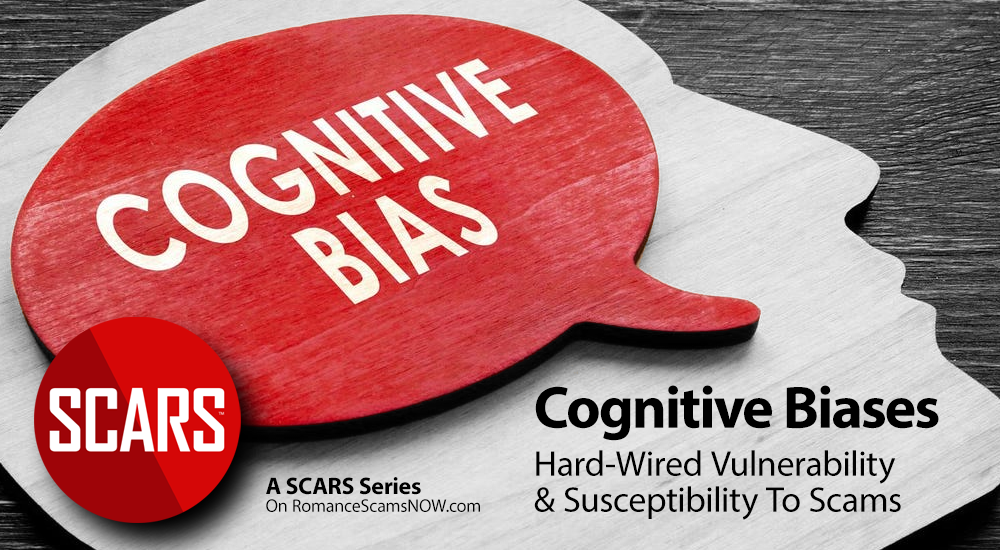



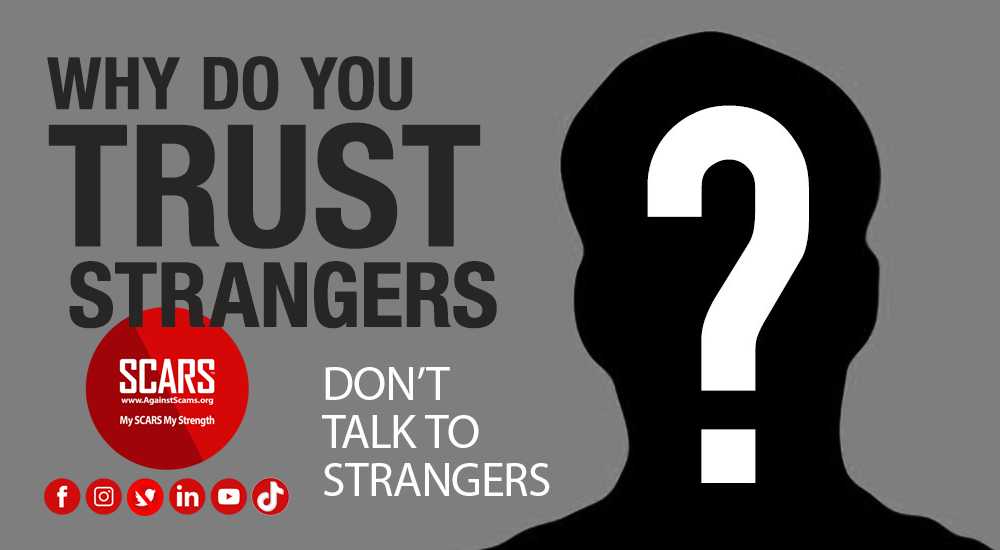
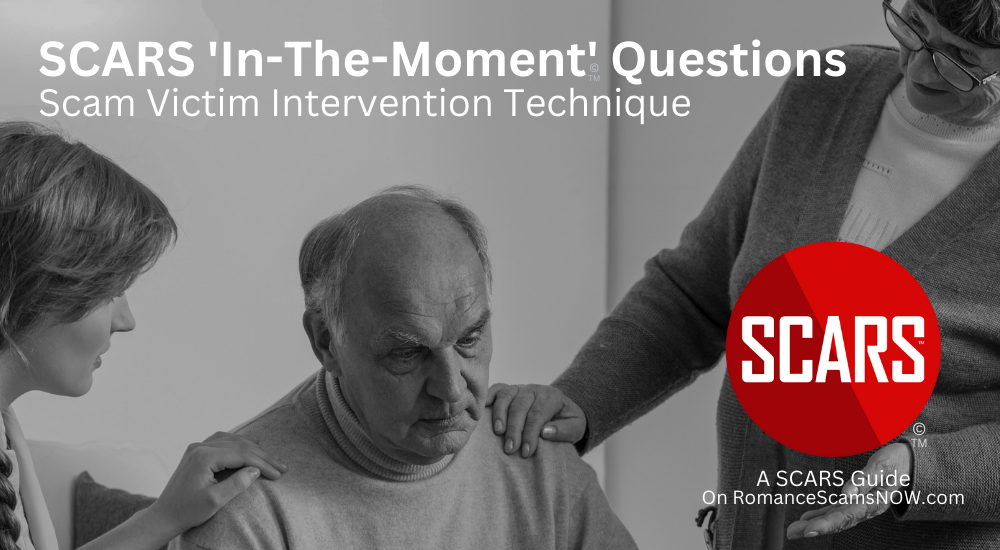

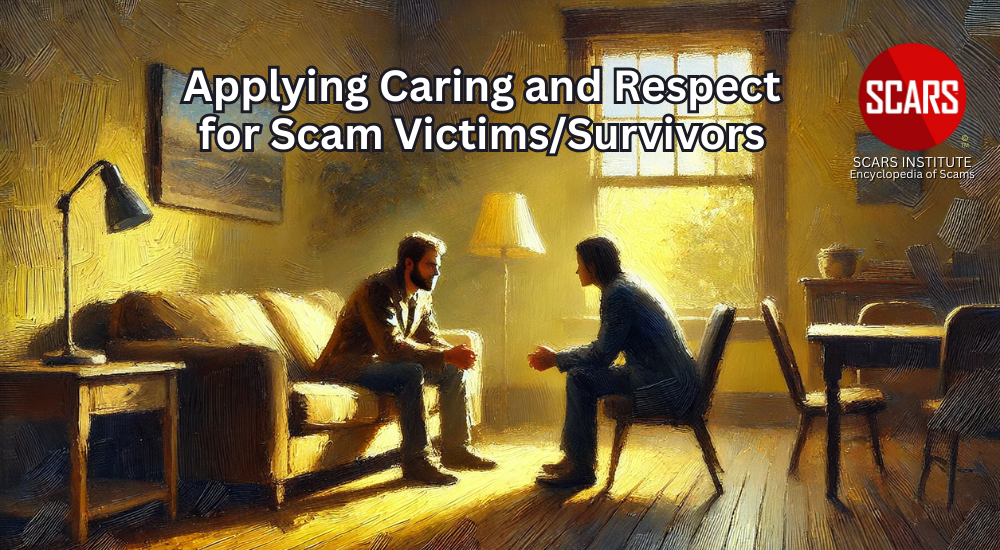





I work hard not to compare my situation with anyone else’s. First, I do not know of anyone else in my relative area that has experienced this situation. I acknowledge there could be but that is as much as I can do without knowledge. Second: I used only my credit cards, I did not use retirement funds, or try to palm cash from the register where I work, nor access my father’s accounts. I made it clear to the scammer that in the state where I live, there is a clause that if the spouse is the primary beneficiary of the retirement account, their signature on a document must first be obtained before a disbursement from the account could be obtained. The scammer was very frustrated with this information and tried to convince me that it was unfair. Third: my scam began in late July, the transfer of monies via wire transfer and gift cards happened over a 3 week period and was complete by late August. That was when the scammer made a comment in text that essentially “woke” me up. I then claimed I was applying for bankruptcy and had no more funds. The scammer attempted to get me to open new credit cards, the scammer attempted (and sadly, I complied) to get account ID’s and passwords. In early September I experienced large identity theft. So many accounts and credit cards were opened in my name in a 8 hour period, I couldn’t keep up with it. Additionally, my personal checking and joint checking were also affected in very large amounts. I successfully closed all the accounts after first freezing my credit reports. After that they have not been able to do anything to open accounts in my name. Everyone who has been scammed is a unique situation, the methods may be similar but as each person is different from each other so too are the crimes that have been committed against them. To compare ourselves is a futile exercise.
It’s easy to feel the world is unjust and out to get you after you have been scammed. Knowing I stopped participating in my scam just before the final trip to the butcher and didn’t fall for the money recovery scam that followed gives me some satisfaction. Hearing stories from other victims is heartbreaking.